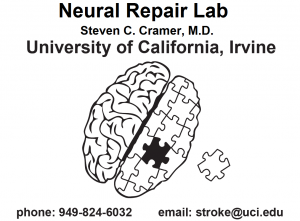The Neural Repair Lab is focused on central nervous system repair in humans and is run by Steven C. Cramer, M.D. This involves understanding pathology, innate repair processes, and issues related to therapeutic intervention. The main tools we use to approach these issues are detailed behavioral/neurological examination, assessment of selected genotypes, anatomical brain imaging, functional MRI, dense-array electroencephalography (EEG), and transcranial magnetic stimulation (TMS). The principal populations in which the lab is focused are those with stroke or with spinal cord injury. Studies are focused on motor system function, where deficits lend themselves readily to measurement, and which are among the most important sources of disability in these populations.
There are no approved treatments for improving outcome once the acute pathological insult of stroke or spinal cord injury is established. The current thrust is focused on evaluating new treatments. Approaches include motor imagery, cellular therapy, dopamine agonists, robotic interventions, brain stimulation (including use of repetitive TMS), and telehealth. Brain mapping via functional MRI, EEG, and neurophysiological mapping/assessment via TMS accompany intervention to predict responsiveness and to describe biological effects of intervention.
Here is a listing of articles that I have published to date: https://www.ncbi.nlm.nih.gov/myncbi/browse/collection/41142932/?sort=date&direction=descending
Video of Dr. Steven Cramer, M.D.
- To develop therapies that reduce disability after neural injury
- To identify biomarkers of brain plasticity for motor improvement
- To understand the basis and biology of inter-subject variability in behavioral outcomes after CNS injury such as stroke
- To promote stroke education and awareness
Photo of Lab Staff Members:

